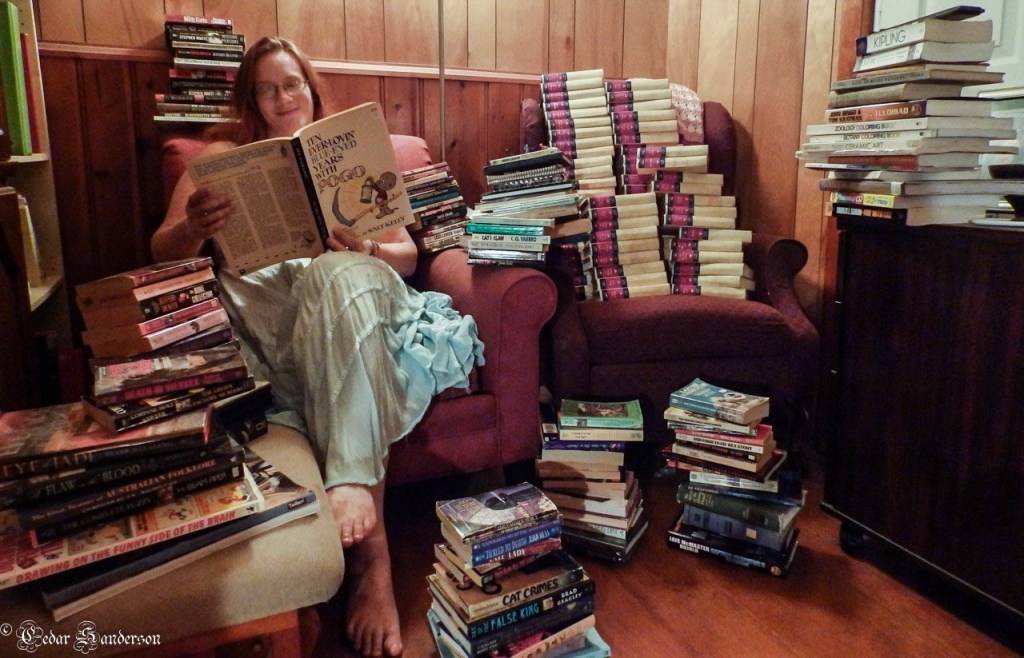There’s a whole lot of mis- being thrown around the internet these days. Seems like men can’t make a move without being accused of being a misogynist, which leads to the accusers being accused of misandry… and then Mike Hoover made this word up, and I am running with it.
Mislectorist: being an author who hates (or at least dislikes, disdains, and disregards) their readers. This leads to poor behaviors on the author’s part, and support of tactics by publishers and other support staff that leaves readers out in the cold.

There are several ways we can see mislectorism manifested. This one hit the interwebs hard yesterday: a literary agent (one who is, in theory anyway, responsible for seeing that only good books make it through the gates to reach publishers and from there, readers) comparing Amazon to ISIS and proclaiming that Amazon is why writers can’t make a living. Not only is this a gross deviation from observable reality, it is a prime example of becoming a mislectorist. This fine chappie isn’t at all concerned with the readers, and what they might want, he’s only out to protect his own job and future.
Newsflash: without readers, authors, publishers, and yes, even literary agents, are purposeless. Books are a product, and a product needs a market. Readers like you and I (setting aside my own author hats and publishing hat and editor hat, and dang, I have a lot of hats. But I like hats) are what drive that market. We want little, really. We would like to have enjoyable fiction, well-researched and informative non-fiction, and we’d like it not to cost too much. We know authors need to eat and pay the internet bill so they can keep on looking at cat videos and avoiding writing… ahem. As I was saying, it’s not that readers want their books for free. It’s that they have bills of their own, and fiction in particular is a luxury purchase. I don’t know about you, but a 13.99 ebook would eat close to half my monthly book budget (poor college student. This is why God smiled and nudged Andrew Carnegie to build public libraries, and they will come… but I digress. Again).
Coming back to examples of mislectorism, we have Hachette, who would like to stick it to the readers, and Amazon, and their own authors. And yet, still, we see authors who insist that Hachette is the underdog (seriously? Just how many of these people are delusional, and how much fiction do they think we want in our real life?). They don’t care about the readers who’d like to be able to afford more than one or two books a month, they just want to make sure their publisher is happy. Realistically, the publisher set those prices. Amazon doesn’t have to offer discounts. They do because they recognize that people, the market, the readers, want a bargain.
And then there are the mislectorists who take a more direct route to insulting their readers. I’m talking about the misguided and beknighted authors who attack their reviewers. Look, not every reader is going to like your book. You can’t take it personally, and for heaven’s sake, you can’t go stalking readers who publicly share a less-than-complimentary opinion of your book.
In a combination of the above, and the ‘writing a book so bad that the readers need to gouge their eyes out with a grapefruit spoon’ we have the authors who try to accomplish something with fiction that they are incapable of, or that better belongs in a textbook somewhere, rather than in a medium ostensibly meant to entertain. Especially when readers learn that the words fresh, original, ground-breaking, or transgressive mean none of the above, and certain awards become cues to put the book back on the shelf like you’ve grabbed a hot potato. Mislectorism can mean mistreating your readers through bad writing. Let’s face it, there are so many boring books out there that there exists (to my great amusement) a Boring Book Club that will give you recommendations and reviews of boring books. Got insomnia? Go check it out. But these authors are not malicious mislectorists, only misguided.
In the worst display of malevolent contempt for readers, we find the plagiarists. These scum, not content with stealing from other authors, treat the readers as though they won’t catch on to what they are doing. David Farland writes at length about the recent troubles around Rachel Nunes’ books, and brings up a sort of plagiarism that sends a shiver down my spine. “The worst of the plagiarists are creating “Frankensteins,” books cobbled together from one chapter here, another chapter there, so that technically the author can’t be held accountable for breaking copyright laws. The reader doesn’t know that he has been swindled until he gets a few chapters into the book.” I read enough, and enough non-memorable books, that I might read something like this and simply feel like I had a bad case of deja-vu. As an author, I might never know it had been done to my work without the kindness of readers.
Authors, don’t be mistlectorists. Educate yourself about readers, and how to be sensitive to their needs and desires. I won’t go so far as to say you should write as rapidly as they would like (I don’t want to read about spontaneous combustion of fingers and keyboards from friction) but when you see a raft of negative reviews, do not comment. Instead, weigh them objectively. Are you committing boring books, or message fiction? How can you improve your writing craft to make your readers happier? There are some examples of mislectorism I can trust you to already avoid, like plagiarism, or comparisons of the world’s largest bookseller to dirty unwashed barbarians who like to chop heads off innocents. That’s just common sense.






27 responses to “Mislectorist”
Reblogged this on Cedar Writes and commented:
I’m making a new word come to life over at the Mad Genius Club.
Ah, the ‘guilt by association’ attempt – especially when there’s no actual association, they make it extra special by making it up. That literary agent must be one of the more delusional folk out there. *shakes head*
Really though, don’t they see they’re wrecking their own jobs? Why would any author want to work with them, when clearly they’re going to badmouth their clients?
This particular one is so exclusive he doesn’t have to worry about anyone wanting to work with him. Of course, if you go through life with your nose that high in the air you have a bit o’difficulty seeing where you’re stepping.
Ah, one of those. It’s funny to watch them walk into manholes…
The I-can’t-believe-he-said-this-with-a-straight-face quote: “I believe with the restored health of the publishing industry and having some sense of where this sort of Isis-like distribution channel, Amazon, is going to be buried and in which plot of sand they will be stuck, publishers will be able to raise the author’s digital royalty to forty or fifty percent.”
Um, yeah… I can *totally* see publishers like Hachette tripping all over themselves to increase their authors’ royalties to those levels. Though, there is a certain weasel-like logic in this: “We’d just love to increase your digital royalties to forty percent, even fifty. But with that dastardly Amazon standing in our way, no-can-do.” This, of course, is that tried and true game straight from the Manipulation 101 textbook, called “Let’s You and Him Fight.”
Reblogged this on Aquila et Infans and commented:
A very interesting article on the phenomenon of authors believing that they have more rights than they really do.
This is timely because I’m doing a book talk this weekend (for non-fiction, about regional history books: the Good, the Bad, and the Well-meaning-but-horrible). All the folks there are/will be readers, and my job (under my history hat) is to keep them interested in reading and researching local and regional history. Because without readers, the stories die, and in some cases the history dies as well.
Yes! and local history can have some wonderful stories hidden in it.
Readers are awesome. They are why people can sit in corners writing great stories for money. How hard is that to understand? Really? Those tottering publishing empires would be dust– they would never have existed– had not lots of eager readers parted with cash for a great story. Maybe a better question is why those readers are going elsewhere…
Haven’t several big name authors, once theyade it big, started to treat their most avid readers like they carry ebola?
I have a certain sympathy. I’ve been a “fan” once. It’s different than just really liking an author’s books and talking about them and recommending them. You end up emotionally invested in them. You spend a great deal of time on your *identity* as a fan. This doesn’t have to rise to the level of obsession, merely to the level of relationship. And that’s when I stopped being a fan. I brought my big pile of books to Lois Bujold to sign and while she was *wonderful* I realized that I had a relationship with her and she *didn’t* have a relationship with me. And I got totally weirded out at that somewhat creepy realization… and this was me as a totally sane very *mild* fan. What must the extremes be like?
The politics? The authors who are “suddenly” insulting to their readers on whatever political issue pretty much always have been. I don’t think they become more free with their opinions when they get “big”, I think we just hear about it.
Reblogged at Through the Worldgate.
Ah, the death throws of a once vital and necessary industry now rendered superfluous by technology.
Pity is that the publishing business, and I include agents in that mix, might have and still could with a minimum of effort adjust and adapt to the new paradigm. Baen certainly did, and is doing exceptionally well as far as I can tell.
There are any number of services necessary to ensure a successful rollout of an author’s work, writing the damn thing is the very necessary first step and rests solely on an author’s shoulders. Proofing, editing, formatting, cover art, promotion, distribution, all enhance the process of getting a work from the author’s brain into the reader’s hands. And all can be provided by an involved and supportive publisher, or each can be bought by the yard by an independent writer.
Those of us paying attention, whether writers ourselves or merely attentive readers interested in the process, are in the position of watching while an industry implodes through greed and a steadfast refusal to accept a new reality. Tain’t pretty, but most certainly entertaining in a terrible train wreck sort of way.
What’s interesting is how some of these people reaction to the news that they’re not doing themselves any favors. They completely flip out, which just reenforces the damage they’ve done up to that point.
It’s both humorous and sad at the same time.
Pick a title for your story, then google that tittle to see how many other authors have already written something with that title, or something similar.
Write about heroes and heroics, murder and murderers, the sea and those who sail upon it, mountains, and deserts, empire and conquest, kings and slaves, horrible monsters, and deceitful betrayers, confidence men and thieves, politicians (whoooo boy). Write about men and women; is there a story about men and women that hasn’t been written at least once? Beauty and the Beast? Women who love monsters?
Once upon a time, it was a dark and stormy night. . .and the fire burned low when there came a knock at the door. on a night that no traveler should be forced to endure.
Does start the imagination, doesn’t it?
Reblogged this on bhalsop and commented:
More in the insanity against independent authors and Amazon. I would weep if it weren’t do hilarious.
Reblogged at bhalsop. Thank you , thank you, thank you. I love the new word and promise to use it five times today. I heard about this editor the other day, and frankly thought it was a made-up story. I have been disabused of that notion by your cogent and delightful post.
You are most welcome 🙂 As soon as I saw Mike use it, I told him I’d steal it. It’s so useful!
Yep, we see a lot of examples of ‘Mislectorist’ now a days. Uncle Lar’s comment reminded me of my days in the US Navy. The XO was an Annapolis grad. One day just before he was replaced and I hope went to a better berth, he gave I and another enlisted man some advice. “The one thing I learned at Annapolis that has stood me in good stead was ‘Be flexible’ If you can do that, you will always succeed. Every screw up I’ve made was when I did not follow that piece of advice. In a way, it is good to see the big five, learn that lesson. Shows that stupid is not confined to me, alone.
For those who missed my FB post on the subject. a “small” group of authors won their fight to file a *class action* suit over royalties, against Harlequin. That, plus the Ellora’s Cave suits means that the “games” being played, are on the way out. A _real, honest_ accounting of sales is coming. I expect RICO (Racketeering In Corrupt Organization), yes the ones used to fight drug dealer, corrupt unions and the Mafia, are on the way. Once the depositions start, along with *forensic accounting exams* start, watch the panic start. RICO means _forfeiture_ of all “ill gotten gains.” It could potentially apply to some _very_ Big Name Authors (like many Authors United). Companies, and _executives_ will probably be bankrupted.
From your lips to God’s ear.
I don’t have a facebook, so is there somewhere else this can be read?
(I have a vicious stalker online.)
On Twitter, I do a feature called “obscure words of the day.” With permission, I’d like to use “mislectorist” on Monday. May I?
May I *please* ? 😉
Of course! Prior to this post, I googled, and the word was not in use, so I have no idea how far it will spread!
Reblogged this on martinlakewriting and commented:
This is a useful thing to pin to an author’s desktop.